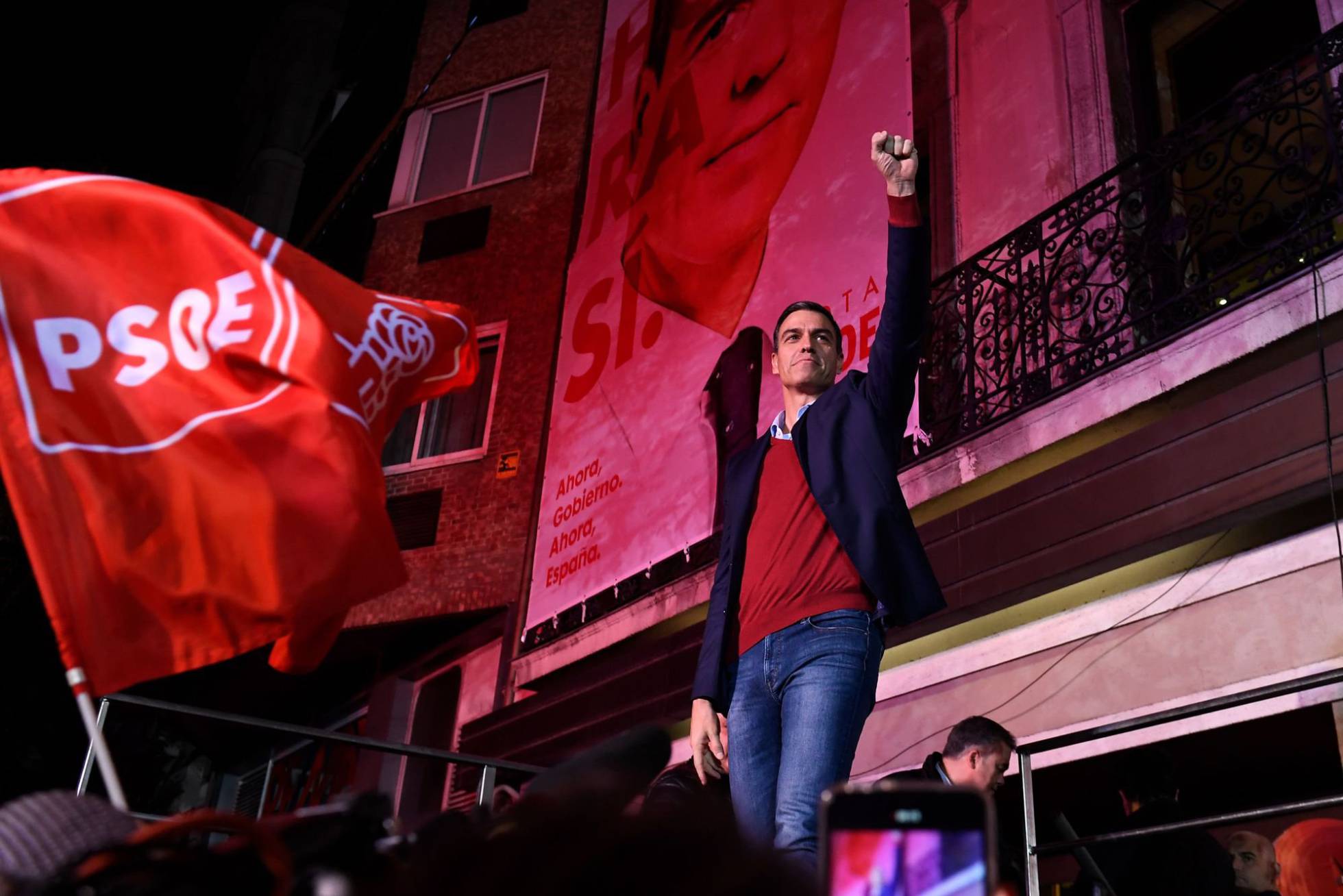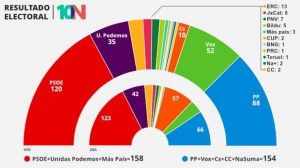Cuatro elecciones en cuatro años
Please scroll down for the English version.
Los españoles acudieron a las urnas el pasado domingo, 10 de noviembre, para votar en las elecciones generales. Las elecciones – que son las cuartas celebradas en tan solo 4 años – se convocaron para tratar de poner fin al bloqueo político que impide a España formar un Gobierno estable desde 2015.
Sin embargo, los resultados parecen complicar aún más la situación: el Partido Socialista Obrero Español (PSOE), liderado por el presidente del Gobierno, Pedro Sánchez, ganó el mayor número de escaños, pero se volvió a quedar sin alcanzar la mayoría absoluta; y el partido de extrema derecha Vox pasó de 24 a 52 escaños, convirtiéndose en la tercera fuerza política del Congreso.
El conservador Partido Popular (PP) quedó en segundo lugar, consiguiendo 87 escaños; Unidas Podemos – una coalición formada por varios partidos de izquierda – se quedó con 35 de los 42 escaños que había conseguido en las anteriores elecciones; y el partido de centro-derecha Ciudadanos sufrió una terrible derrota, perdiendo más de 40 escaños y quedándose con solo 10 representantes en el Congreso.
Es necesaria una mayoría absoluta de 176 escaños para poder gobernar, así que queda por ver si los distintos partidos podrán llegar a un acuerdo para sacar a España del bloqueo político.
¿Cómo ha llegado España a esta situación?
Durante décadas, el PSOE y el PP habían tomado turnos en el poder, pero la crisis económica condujo a la aparición de partidos de protesta. Desde entonces, la política española se ha definido por la falta de mayorías parlamentarias y la incapacidad de los políticos para llegar a acuerdos de gobierno.
Esta repetición electoral se ha celebrado porque Sánchez ganó el mayor número de votos en las elecciones generales del 28 de abril, pero no llegó a alcanzar la mayoría absoluta, y los diferentes partidos fueron incapaces de formar la coalición necesaria para gobernar. Con estos nuevos resultados, formar una coalición parece todavía más difícil.
¿Y ahora qué?
Tras los resultados, Sánchez dijo que su prioridad es “formar un Gobierno progresista estable para hacer políticas en beneficio de la mayoría”. Menos de 48 horas después, Sánchez anunciaba un acuerdo con Unidas Podemos, el partido anti-austeridad liderado por Pablo Iglesias.
Sánchez, que afirmó hace tan solo dos meses que “no dormiría tranquilo” teniendo en un Gobierno de coalición a personas “de la confianza” de Pablo Iglesias, aseguró que “los desacuerdos del pasado no importan”.
A pesar del acuerdo, el PSOE y Unidas Podemos suman sólo 155 votos, lejos de los 176 que marca la mayoría absoluta del Congreso. Es necesario por tanto un camino de diálogo con otros partidos si Sánchez quiere formar gobierno. De momento, las negociaciones continúan…
Spain’s fourth election in four years
Spanish citizens headed to the polls last Sunday, 10th of November, to vote in the general election. The elections were called in an attempt to put an end to the political deadlock that has seen Spain unable to form a stable government since 2015.
However, the results of the election seem to complicate the situation even more: the Socialist Party (PSOE), led by Prime Minister Pedro Sánchez, won the highest number of seats again but fell short of an absolute majority; and the far-right party Vox jumped from 24 to 52 seats, becoming the third-largest political force in Congress.
The conservative Popular Party (PP) came in second, winning 87 seats; Unidas Podemos – a coalition formed by various left-wing parties – retained 35 of the 42 seats it had won at the last election; and the centre-right party Ciudadanos (Citizens) suffered a crushing defeat, losing more than 40 seats to be left with just 10 representatives in Congress.
An absolute majority of 176 seats is needed to form a government, so it remains to be seen if the different parties will be able to reach a deal to get Spain out of the political blockade.
How did Spain get here?
For decades, the PSOE and PP had taken turns in power, but the economic crisis led to the formation of protest parties. Since then, Spanish politics have been defined by a lack of parliamentary majorities and the inability of politicians to reach governing deals.
This repeat election was celebrated because Sánchez won the highest amount of votes at the April 28 general election but fell short of an absolute majority, and the different parties were unable to form the necessary coalition to govern. With these new results, forming a coalition seems even harder.
What now?
After the results came in, Sánchez said that it was his priority to “form a stable progressist government and do politics for the benefit of the majority of Spaniards”. Less than 48 hours later, Sánchez announced a coalition deal with Unidas Podemos, the anti-austerity party led by Pablo Iglesias.
Sánchez, who said only two months ago that “he would not sleep peacefully” having in a coalition government people “of the trust” of Pablo Iglesias, said that “disagreements of the past do not matter”.
Despite the agreement, the PSOE and Unidas Podemos have only 155 votes, far from the 176 that marks the absolute majority in Congress. A path of dialogue with other parties is therefore necessary if Sánchez wants to form a government. For now, negotiations continue…
Interested? Read more about the topic in Spanish (here and here) or English (here and here).
Vamos Let's Learn Spanish. Spanish courses in London. Spanish courses in Valencia.
¿Cuánto sabes? / Tell us what you think
Your email address will not be published. Required fields are marked *
You must be logged in to post a comment.









Hola Julia,
Thank you for such a great explanation.
Russell
¡Gracias, Russell!